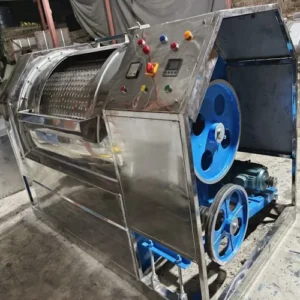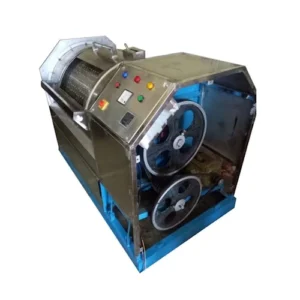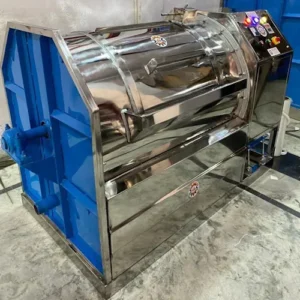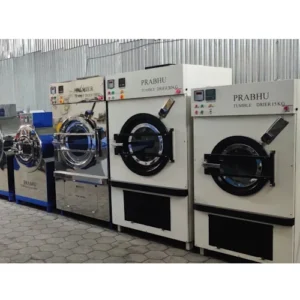Industrial Washing Machine
-
Industrial Laundry Washing Machine, 50 Kg, Top Loading
Capacity 50 KgMachine Capacity 50 kgLoading Type Top Loading₹95,000.00 -
Top Loading 50 Kg Industrial Washing Machine
Capacity(Kg) 50kgFunction Type Semi-AutomaticLoading Type Top Loading₹135,000.00Top Loading 50 Kg Industrial Washing Machine
₹135,000.00 -
Laundry Commercial Washing Machine, 25 kg
Rated Capacity 25 kg.Capacity (kg) upto 20 kgLoading Type Top Loading₹110,000.00Laundry Commercial Washing Machine, 25 kg
₹110,000.00 -
Hotel Laundry Washing Machine, Front Loading
Loading Type Front LoadingBrand PRABHUUsage/Application Hospital,Laundry,Hotels₹465,000.00Hotel Laundry Washing Machine, Front Loading
₹465,000.00
Industrial Washing Machine: The Ultimate Guide to Large-Scale Cleaning Solutions
Introduction
Industrial washing machines are essential for businesses that require high-capacity, heavy-duty cleaning solutions. Unlike residential washing machines, industrial models are designed for continuous use, handling large loads of laundry efficiently and effectively. Industries such as hospitality, healthcare, manufacturing, and food processing rely on industrial washing machines to meet strict hygiene and cleanliness standards.
In this comprehensive guide, we’ll explore everything about industrial washing machines, including their types, features, working principles, applications, benefits, maintenance tips, and buying considerations.
1. What Is an Industrial Washing Machine?
An industrial washing machine is a high-capacity laundry machine built to clean large volumes of textiles, linens, uniforms, and other washable items. These machines are typically larger, more durable, and more powerful than household washers, offering faster cycle times, enhanced efficiency, and better water and energy savings.
They are commonly used in hotels, hospitals, laundromats, food processing plants, commercial laundries, and factories where high-performance washing is essential.
2. Types of Industrial Washing Machines
There are several types of industrial washing machines designed for different applications and industries.
2.1 Washer-Extractor Machines
-
Combines washing and extracting (spinning) in one unit
-
High-speed extraction removes excess water for faster drying
-
Suitable for hotels, hospitals, and laundromats
2.2 Continuous Batch Washing Machines (CBW)
-
Also called tunnel washers
-
Processes multiple loads in sequence without stopping
-
Designed for large-scale laundries and industrial applications
-
Reduces water and energy consumption
2.3 Barrier Washing Machines
-
Specifically designed for hospitals and pharmaceutical industries
-
Prevents cross-contamination by separating clean and dirty laundry areas
-
Essential for infection control
2.4 Side-Loading and Front-Loading Industrial Washers
-
Front-loading machines are energy-efficient and provide thorough washing
-
Side-loading models are suitable for continuous operation in factories
2.5 Heavy-Duty Drum Washers
-
Used in industries like manufacturing, metalworking, and food processing
-
Cleans mechanical parts, equipment, and reusable packaging materials
2.6 Portable Industrial Washing Machines
-
Small, mobile washers used in emergency or temporary industrial setups
-
Often used by construction companies and disaster relief organizations
3. How Does an Industrial Washing Machine Work?
Industrial washing machines use a combination of mechanical agitation, water pressure, and detergent action to clean large loads of laundry efficiently.
3.1 Key Components and Their Functions
-
Drum (Inner and Outer Tub): Holds laundry and facilitates washing
-
Water Inlet Valve: Regulates water flow
-
Detergent Dispenser: Releases detergents and cleaning agents
-
Agitator or Impeller: Enhances washing action
-
Drain System: Removes dirty water
-
Heating Element (Optional): Controls water temperature
-
Control Panel & Programmable Logic Controller (PLC): Manages washing cycles
3.2 Washing Process Step-by-Step
-
Loading: The machine is loaded with laundry
-
Filling with Water & Detergent: Water and detergent are dispensed
-
Washing Cycle: The drum rotates for mechanical agitation
-
Rinsing: Clean water flushes out detergent and dirt
-
Spinning/Extraction: Water is removed at high speed
-
Unloading: Clean laundry is removed for drying
4. Key Features of Industrial Washing Machines
4.1 Large Load Capacity
Industrial washers can handle loads ranging from 10 kg to over 200 kg per cycle.
4.2 High-Speed Spin Cycles
-
Reduces moisture content for faster drying
-
High G-force extraction minimizes drying time
4.3 Energy and Water Efficiency
-
Advanced models use optimized water levels and energy-efficient motors
-
Recycling water systems reduce waste
4.4 Programmable Wash Cycles
-
Allows customization for different fabric types and soil levels
-
Includes hot, cold, and steam wash options
4.5 Automatic Detergent Dosing
-
Ensures correct detergent usage
-
Prevents excess detergent waste and residue buildup
4.6 Stainless Steel Construction
-
Prevents corrosion and enhances machine durability
-
Suitable for harsh industrial environments
5. Applications of Industrial Washing Machines
5.1 Hotels and Hospitality
-
Cleaning bedding, towels, uniforms, and table linens
-
High-speed cycles ensure quick turnaround for guests
5.2 Healthcare and Hospitals
-
Washing patient gowns, surgical linens, and bed sheets
-
Ensures strict hygiene and disinfection standards
5.3 Commercial and Industrial Laundries
-
Handles large volumes of linens and uniforms
-
Used in service laundries catering to hotels and hospitals
5.4 Food Processing and Manufacturing Plants
-
Cleaning employee uniforms and safety gear
-
Washing reusable food handling cloths and aprons
5.5 Military and Emergency Services
-
Cleaning firefighter gear, military uniforms, and rescue equipment
-
Machines are built to withstand heavy-duty washing cycles
6. Benefits of Industrial Washing Machines
6.1 Increased Productivity
-
Large load capacity allows businesses to wash more laundry in less time.
6.2 Cost Savings
-
Energy-efficient designs reduce electricity and water consumption.
-
Lower labor costs due to automated functions.
6.3 Superior Cleaning Performance
-
Removes stubborn stains, grease, and bacteria effectively.
-
High-speed extraction reduces drying time, saving energy.
6.4 Longer Lifespan
-
Industrial washers last 10-20 years, compared to residential washers (5-7 years).
7. How to Choose the Right Industrial Washing Machine
7.1 Capacity Requirements
-
Small laundries: 10kg – 50kg capacity
-
Large commercial laundries: 50kg – 200kg capacity
7.2 Energy and Water Efficiency
-
Choose models with low water consumption and high energy efficiency ratings.
7.3 Automation and Control Features
-
Programmable controls and IoT-enabled monitoring enhance efficiency.
7.4 Durability and Construction
-
Look for stainless steel drums and industrial-grade components.
7.5 Compliance with Industry Standards
-
Ensure the machine meets safety and hygiene regulations (e.g., ISO, CE, NSF certifications).
8. Maintenance and Safety Tips
8.1 Regular Cleaning and Inspection
-
Clean lint filters and detergent dispensers weekly.
-
Check water inlet and drain systems for blockages.
8.2 Lubrication and Component Checks
-
Lubricate moving parts as per manufacturer guidelines.
-
Inspect belts and motors for wear and tear.
8.3 Safety Guidelines
-
Ensure proper ventilation to prevent overheating.
-
Train staff on correct loading and detergent use.
9. Future Trends in Industrial Washing Machines
9.1 Smart IoT Integration
-
Remote monitoring and diagnostics via IoT-enabled washing machines.
9.2 Water Recycling and Eco-Friendly Designs
-
Machines with advanced water filtration and reuse systems.
9.3 AI-Powered Automation
-
Artificial intelligence (AI) improves washing efficiency and cycle adjustments.
Conclusion
Industrial washing machines play a crucial role in commercial and industrial settings, offering efficiency, durability, and cost savings. Whether for hotels, hospitals, laundromats, or manufacturing plants, investing in a high-quality industrial washing machine ensures superior cleaning performance and long-term benefits.
Looking for the best industrial washing machine? Explore leading brands and advanced models to find the perfect solution for your business needs! 🚀




